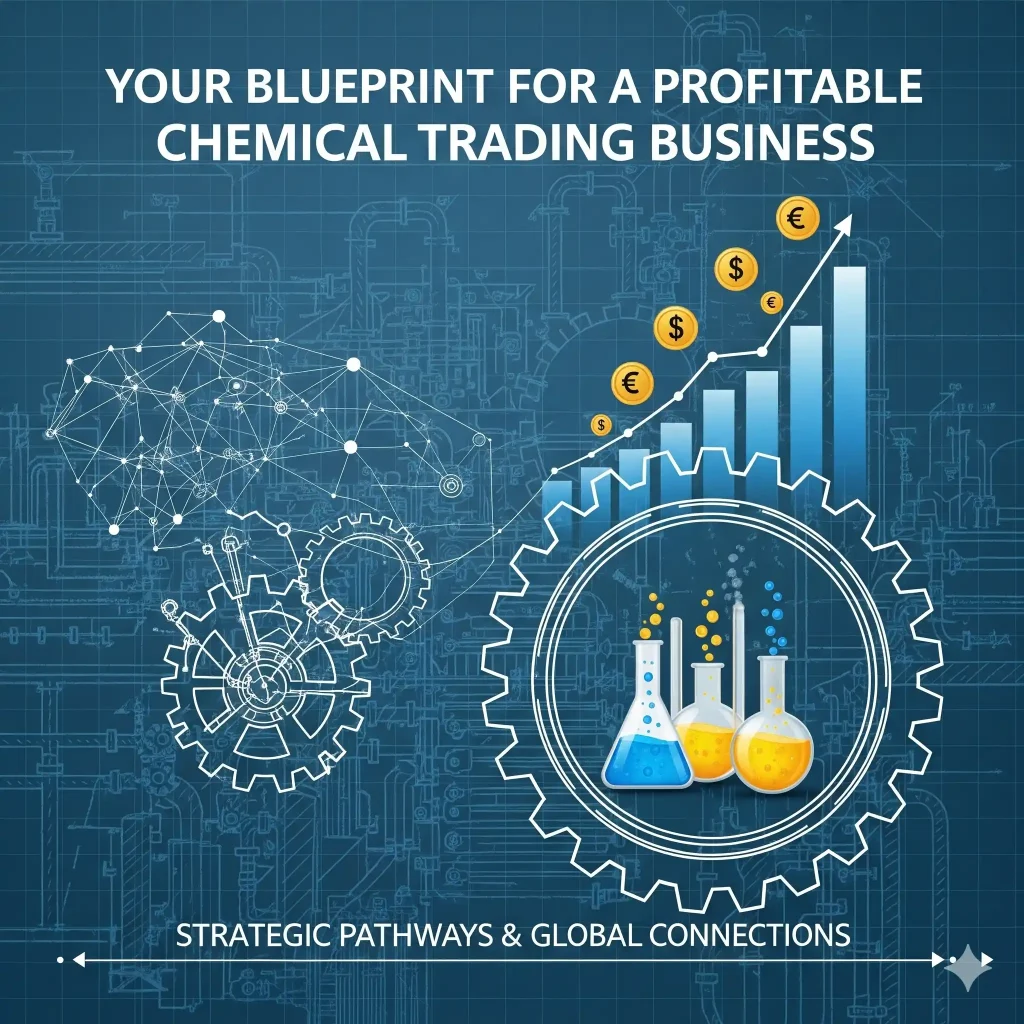It is because of chemicals that modern manufacturing and agriculture exists today. In addition, consumer products are known to contain chemicals. The business of chemicals, thus, makes this one most crucial and lucrative industries.
Chemical trading companies are business ventures where they source their chemicals directly from manufacturers and supply them in smaller quantities to their users. This business model focuses more on logistics, market knowledge, and networking as opposed to manufacturing.
Hence, a chemical trade business can be quite lucrative for one with a strategic mindset. This is a guide for someone who wants to set up a successful business in this sector.

Stand out by finding your niche
The chemical industry is vast. If you sell both agricultural fertilizers and industrial solvents, you’re going to be broke. Instead, narrow down your activities to a specific segment of the market, and then you will know more about that area.
You can then build a network focused on that audience and create a more compelling brand. For better understanding of your customers’ needs, you’ll become their preferred supplier.
Read More: Tata Chemicals Soda Ash Manufacturing Process: A Blueprint for Your Own Plant
1. Specialty Chemicals: a Focus
It can be a profitable venture. Specialty chemicals are low-volume and high-value special-use chemicals applied in a niche industry. For instance, you can supply specialized flavors to the food and beverages industry. Active ingredients and emulsifiers can be specified for cosmetics. Pharmaceutical companies will also require excipients.
Then there would be intermediates and special ingredients. Furthermore, this niche requires technical know-how and understanding of quality. Besides, this niche would bring in higher profits with a less competitive natureworking against bulk traders.
2. Bulk Chemicals for the Industrial Sector
Bulk chemicals or industrial chemicals represent a great opportunity for entering the market. These are used in huge quantities by the manufacturing industry. Examples include solvents for painting, acids or alkalis for metal treatment, or polymers for plastics production.
Although bulk chemicals will not generate as high a profit margin as specialty chemicals, high volumes of sales will still produce tremendously satisfactory revenue.
Efficiency building in the supply chain is the critical element for success in this industry, besides substantial negotiations for competitive prices with the manufacturers and long-term agreements with industrial clients.
3. Catering for the Agricultural Community
Chemical products of consumption by the agricultural industry. Trading companies can reap ample profits from the business of agrochemicals. With a wide array of offerings such as herbicides and insecticides keeping pests at bay, as well as weed management, there is much to offer the agriculturist.
One important aspect is knowing the domestic marketplace in terms of crops and common pests in the area. Value-added service to farmers, such as soil testing or expert advice on applications, goes a long way to ensuring good relationships develop.
4. Eco-Friendly Products
Lead the Green Revolution. Environmental awareness from around the world is strengthening the market demand for sustainable and environmentally safe products. Your business will be at the front line if you trade “green” chemicals. Biodegradable chemicals, bio pesticides, and non-toxic industrial cleaners all betoken this emerging area.
Green chemical specialization will not only lead to a healthy environment, but it will also cater to a rapidly growing market of environmentally conscious businesses and consumers. This niche will build a positive message around your brand.
Read More: Start a Bulk Solvent Business in India: High-Demand, High-Profit
How do you put up a strong foundation for your business?
After deciding on a niche, you need to start establishing the foundations. Planning meticulously together with the laws of the land and a robust supply network are what a successful chemical trading business is founded on.
Read Our Book: Click Here
First, do a thorough market analysis and create a detailed business plan. This business plan should inform about what target market you want to go for, evaluate competitors, and come up with sales and marketing strategies.
Then, get through the legal maze. The chemical industry is heavily regulated for safety as well as environmental issues. You will get several licenses like GST registration and trade licenses. However, based on the niche you choose, additional permits may be required.
For instance, an insecticide license in the case of agrochemicals. Or clearances to store dangerous materials. Keeping abreast with all regulations ensures that the business complies.
Next, develop a huge reliable network of suppliers. Partner with big chemical distributors or good ones like reputable chemical producers.
Read More: Outlook of Indian Chemical Industry in India
The Engine of Your Trade: Master the Operations
Having established the legal framework and business plan, next focus would be on operational excellence. Chemical trading is business that relies-efficient and safe-logistic systems.

Warehouses are critical features in your business. You must acquire a place that can house the chemicals you intend to sell. It must have sufficient ventilation, controlled temperatures if required, and clear demarcation for separating incompatible chemicals for storage.
Establish an inventory management system to keep track of stock levels and expiration dates. All safety commitment such as emergency spill kit provisions, having a fire suppression system is not negotiable.
You must also develop a network of seamless delivery and transportation. Transporting chemicals, particularly hazardous chemicals, is subjected to strict regulations. Labels and packaging must be approved and clearly indicate the contents of the package and any hazards.
Partner with logistics providers that have experience transporting chemicals. Delivering goods on time and reliably is key to building customer loyalty and satisfaction.
Discover the Right Business for You With Our Startup Selector Tool
How can you succeed in the chemical industry?
Entrepreneurs who invest the time in understanding the market and operating with integrity can make a lot of money from chemical trading. Success in this industry is about more than moving boxes. Safety, compliance and establishing relationships with customers and suppliers are key.
If you are able to provide reliable guidance and service, it will be in your best interest, whether you focus on agricultural chemicals that have high margins, industrial chemicals with large volumes, or specialty chemicals. To build a sustainable business, you need to start with a profitable company that is built on operational excellence.
Chemical Trading Business: Frequently Asked Questions (FAQ)
Q1. What’s the main difference between chemical trading and manufacturing?
Chemical manufacturers make chemicals by running different processes. Chemical traders do not make anything. They buy large amounts of chemicals from manufacturers and then sell smaller amounts to customers. They also handle storage, delivery, and paperwork.
Q2. Do you need a chemistry degree for chemical trading?
You do not need a chemistry degree to start trading chemicals. But you must learn about the products you sell. Customers will ask questions, so you need to understand your products well to build trust.
Q3. How do you safely handle hazardous chemicals?
First, set clear safety rules for storing and handling chemicals. Make sure everyone gets training and the right safety gear. Keep all needed licenses and permits up to date. Always have a plan for accidents like spills or fire.
Q4. Which chemical trading area makes the most profit?
Specialty chemicals usually give the best profit because buyers pay more for special products. Still, you can also make good money trading common chemicals if you sell large amounts and manage costs well.
Q5. How do you find your first customers?
Start by searching for possible buyers in your target market. Reach out by phone or email. Build a simple website and join B2B sites like IndiaMART or LinkedIn. Going to trade shows or networking events can help you meet more customers.







